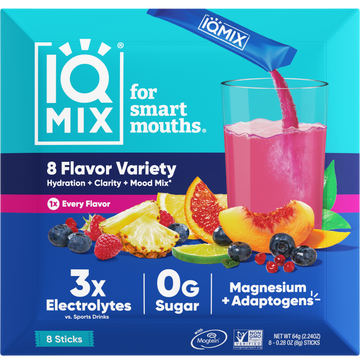We’ve all been there—that frustrating yet familiar feeling of mental fog weighing us down as we struggle to concentrate, recall information, or maintain mental clarity. Often referred to as “brain fog,” this cognitive obstacle can hinder our productivity, mental health, and overall well-being. But what if we told you that relief could be just a dietary change away?
In this article, we’re delving into the ketogenic diet and its potential to lift the veil of brain fog. We’ll explore the science behind this popular dietary approach, its impact on cognitive function, and practical tips on effectively implementing a low-carb diet to help you conquer brain fog once and for all.
Let’s start by laying some groundwork.
What Is Brain Fog?
Brain fog is a term used to describe a collection of symptoms that negatively impact one’s mental clarity, focus, and cognitive function. It’s characterized by symptoms like confusion, mental fatigue, forgetfulness, difficulty concentrating, and a general sense of mental cloudiness.
Brain fog is not a medical condition in itself, but rather a subjective experience that can result from various factors, including stress, lack of sleep, hormonal imbalances, or dietary choices.
It’s important to note that while everyone may experience brain fog occasionally, persistent or severe symptoms may indicate an underlying health issue and warrant a visit to your doctor.
The Keto Diet Defined
The ketogenic (keto) diet is a very low-carb, high-fat diet that has gained considerable popularity for its potential health benefits and weight loss effects.
The primary objective of the keto diet is to shift the body’s metabolism from relying predominantly on glucose (derived from carbohydrates) to utilizing ketones (derived from fats) for energy. This metabolic state, known as ketosis, occurs when the body is deprived of glucose due to the restricted intake of carbs.
The macronutrient distribution in a typical keto diet is as follows:
- Carbs: 5-10% of daily caloric intake
- Fats: 70-80% of daily caloric intake
- Proteins: 20-25% of daily caloric intake
For the average person, this translates to consuming less than 50 grams of carbs per day.
In practice, this means the keto diet encourages the consumption of healthy fats, such as avocados, coconut oil, olive oil, and nuts, as well as moderate amounts of protein from sources like meat, fish, and eggs. Carb intake is significantly limited, with a focus on consuming fibrous, non-starchy vegetables and avoiding high-carb foods like bread, pasta, rice, and sugar.
The Keto Diet and Brain Health
The brain is an energy-intensive organ, consuming approximately 20 percent of the body’s total energy expenditure.[*] Under normal dietary conditions, the brain primarily relies on glucose, a form of sugar derived from carbohydrates, as its primary fuel source.
However, when following a low-carb diet like keto, the brain’s fuel source shifts from glucose to ketone bodies, which are produced when the body breaks down fats in the liver. These ketone bodies can effectively cross the blood-brain barrier and serve as an alternative fuel source for the brain.
There are numerous anecdotal reports of people experiencing improved mental clarity and focus on a keto diet. A considerable amount of research backs up these claims, suggesting a link between the keto diet and enhanced mental clarity, cognitive function, and brain health.
Here are some examples of published research supporting this connection:
- Elevating ketone levels through the use of MCT oil has been demonstrated to enhance memory and attention in older adults.[*]
- The keto diet demonstrates potential for improving cognition in individuals with Alzheimer’s and Parkinson’s disease.[*]
- Children with epilepsy who followed a keto diet exhibited enhanced alertness, cognitive function, and improved behavior.[*]
- Rats fueled by ketones navigated a maze faster than their non-keto counterparts.[*]
What accounts for these benefits? Researchers posit that ketone bodies may be a more efficient energy source for the brain than glucose.
Another possibility is the stabilization of blood sugar levels. By avoiding the blood sugar fluctuations often associated with high-carb diets, low-carb diets like keto may help reduce instances of brain fog and support sustained cognitive function throughout the day.
Practical Tips for Implementing the Keto Diet and Reducing Brain Fog
Ready to embark on your low-carb journey to clear the fog and boost your brainpower? Here are our top tips to help you successfully implement a keto diet while reducing brain fog symptoms:
#1: Mind Your Macros
When following a keto diet, paying attention to your macronutrient distribution is essential. Be mindful of your carbohydrate intake and ensure you’re consuming adequate amounts of healthy fats, proteins, and non-starchy vegetables.
If your macros are off, you’ll likely remain in keto limbo, where you’re eating too many carbs to induce ketosis but not enough to support your brain function. This can contribute to brain fog symptoms.
The quality of your food also matters. Focus on whole, nutrient-dense foods like avocados, nuts, seeds, olive oil, fish, lean meats, and leafy greens. Healthy, high-quality convenience foods like IQBAR can also be part of a balanced keto plan.
#2: Stay Hydrated
Low-carb diets can lead to increased water loss, causing dehydration and subsequent cognitive symptoms like brain fog.
Ensure you consume an adequate amount of water throughout the day. The key word is “adequate”—not too little and not too much. Overconsuming water can deplete your electrolyte levels, especially sodium, which can cause more brain fog and other health problems.[*]
#3: Increase Electrolyte Consumption
On a keto diet, you must bid farewell to many high-carb foods that are rich in electrolytes, including legumes, potatoes, and most fruits. Many people also eliminate refined, packaged foods—a major sodium source.
Additionally, as you restrict carbs, the hormone insulin stays low. This drop in insulin signals your kidneys to excrete sodium via urine at a greater rate than usual. Other electrolytes like potassium are also naturally eliminated through urine.[*]
These factors can lead to electrolyte deficiency, which can cause health issues and increase brain fog. In fact, low electrolytes and dehydration are likely the root cause of the “keto flu”—a short-term constellation of symptoms that many people experience when they first adopt a keto diet.
To combat this, consider adding electrolytes to your water, especially during the initial stages of transitioning to a low-carb diet, to help maintain proper electrolyte and fluid levels. The easiest way to do this is by filling a water bottle with water and adding a high-quality electrolyte supplement, such as IQMIX.
Each packet of IQMIX contains the following:
- 500 mg sodium
- 450 mg potassium
- 750 mg Magtein®, a clinically studied form of magnesium (Mg L-Threonate) that crosses the blood-brain barrier[*]
- 250 mg of super-concentrated lion’s mane mushroom, which supports brain health and function[*]
IQMIX is safe for those on a low-carb diet or those with diabetes, as it contains zero sugar and only 3 grams of carbs per packet. It’s available in delicious flavors, including Peach Mango, Lemon Lime, Blueberry Pomegranate, and Blood Orange. Try our 8-Stick Sampler to find your favorite flavors!
A Final Note About Going Keto for Brain Fog
As you embark on your keto journey, remember that the key to success lies in personalizing your approach and staying mindful of your body’s needs.
For example, depending on your age, activity level, and health status, you might need more or less carbs, protein, fats, water, and electrolytes. It’s best to check in with a doctor or dietitian to ensure you’re on the right track.
So, go forth and let your low-carb lifestyle be the beacon that guides you through the fog toward a brighter, more focused future.
Written by Katie Koschalk, a health and wellness writer, certified holistic nutritionist, and certified personal trainer based in California.




